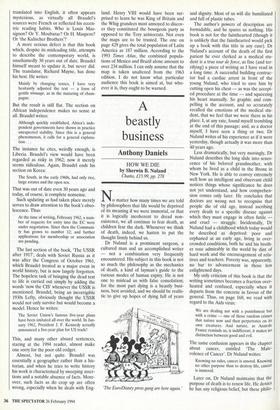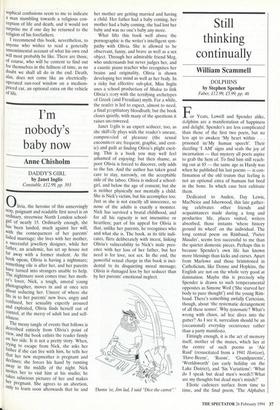A beastly business
Anthony Daniels
HOW WE DIE by Sherwin B. Nuland Chatto, £15. 99, pp. 278 No matter how many times we are told by philosophers that life would be deprived of its meaning if we were immortal, or that it is logically incoherent to dread non- existence, we all continue to fear death, as children fear the dark. Whenever we think of death, indeed, we hasten to put the thought firmly behind us.
Dr Nuland is a prominent surgeon, a cultured man and an accomplished writer — not a combination very frequently encountered. His subject in this book is not so much the philosophy as the mechanics of death, a kind of layman's guide to the various modes of human expiry. He is not one to mislead us with false consolation; for the most part dying is a beastly busi- ness, best avoided, and we should be realis- tic to give up hopes of dying full of years 'The EuroDisney press gang are here again.' and dignity. Most of us will die humiliated and full of plastic tubes.
The author's powers of description are formidable, and he spares us nothing. His book is not for the fainthearted (though it is unlikely that the fainthearted would pick up a book with this title in any case). Dr Nuland's account of the death of the first patient he ever clerked as a medical stu- dent is a true tour de force, as fine (and ter- rifying) a piece of writing as I have read in a long time. A successful building contrac- tor had a cardiac arrest in front of the young Nuland, who tried to save him by cutting open his chest — as was the accept- ed procedure at the time — and squeezing his heart manually. So graphic and com- pelling is the account, and so accurately recalled the emotions of the medical stu- dent, that we feel that we were there in his place. I, at any rate, found myself trembling at the end of this passage; and, as a doctor myself, I have seen a thing or two. Dr Nuland writes of his experience as if it were yesterday, though actually it was more than 40 years ago.
Less dramatically, but very movingly, Dr Nuland describes the long slide into senes- cence of his beloved grandmother, with whom he lived as a child in the Bronx in New York. He is able to convey extremely well how an intelligent and observant child notices things whose significance he does not yet understand, and how comprehen- sion comes only later. He concludes that doctors are wrong not to recognise that people die of old age, instead ascribing every death to a specific disease against which they must engage in often futile — and cruel — struggle. Incidentally, Dr Nuland had a childhood which today would be described as deprived: poor and orphaned at an early age, living in over- crowded conditions, both he and his broth- er rose admirably in the world by dint of hard work and the encouragement of rela- tives and teachers. Poverty was, apparently, no bar to advancement in those less enlightened days.
My only criticism of this book is that the writing sometimes becomes a fraction over- heated and confused, especially when it departs from the concrete in favour of the general. Thus, on page 168, we read with regard to the Aids virus:
We are dealing not with a punishment but with a crime — one of those random crimes that nature now and then perpetrates on its own creatures. And nature, as Anatole France reminds us, is indifferent; it makes no distinction between good and evil.
The same confusion appears in the chapter about cancer, entitled The Male- volence of Cancer'. Dr Nuland writes:
Knowing no rules, cancer is amoral. Knowing no other purpose than to destroy life, cancer is immoral.
Later on, Dr Nuland maintains that the purpose of death is to renew life. He denies he has any religious belief, but these philo- sophical confusions seem to me to indicate a man stumbling towards a religious con- ception of life and death, and it would not surprise me if one day he returned to the religion of his forefathers.
I recommend this book, nevertheless, to anyone who wishes to read a generally unsentimental account of what his own end Will most probably be like. There are those, of course, who will be content to find out for themselves in the fullness of time, as no doubt we shall all do in the end. Death, alas, does not come like an electrically- operated sun-roof window on a medium- priced car, an optional extra on the vehicle of life.



























































 Previous page
Previous page